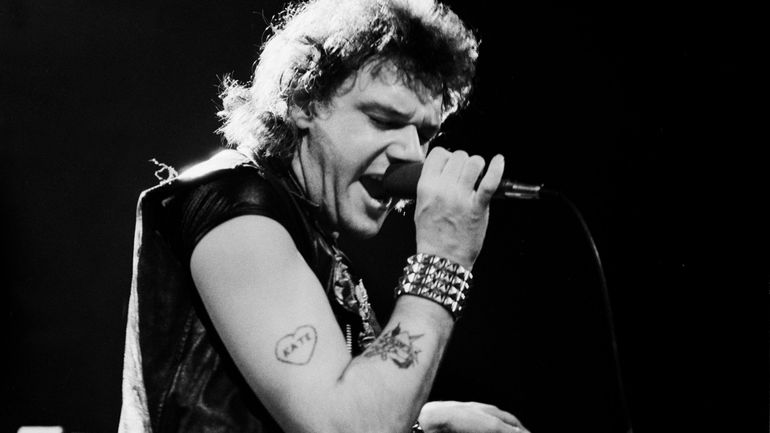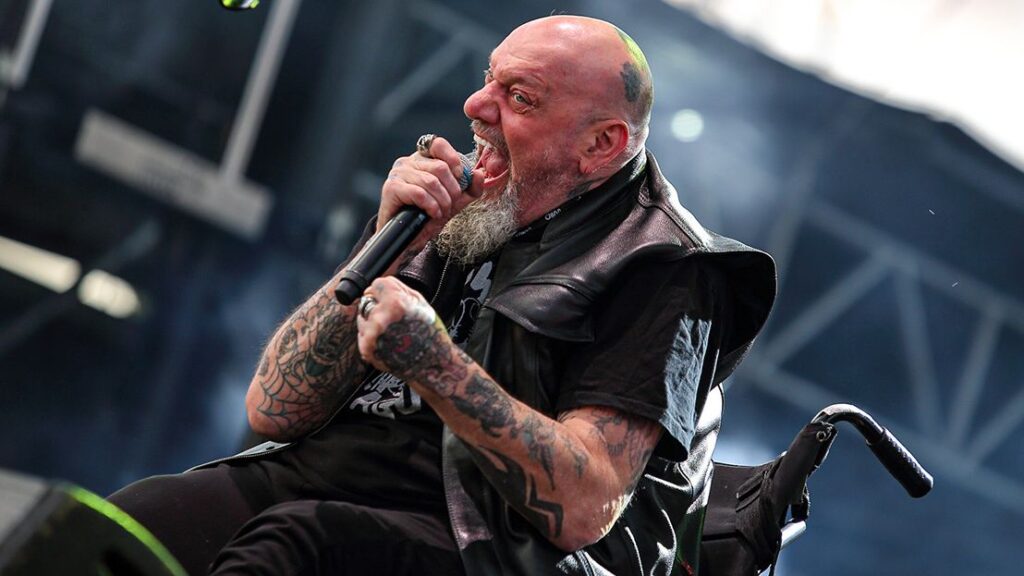
Paul Di’Anno, was a prominent figure in the world of heavy metal music, recognized especially for his contributions as the original lead vocalist of the legendary band Iron Maiden.
His tenure with Iron Maiden, which spanned from 1978 to 1981, coincided with the band’s formative years and saw the release of their first two groundbreaking albums. These records played a pivotal role in shaping the future of heavy metal, cementing Di’Anno’s legacy as an influential figure in the genre’s development.
Early Life and Musical Beginnings
Paul Di’Anno was born Paul Andrews on May 17, 1958, in Chingford, London, England, and grew up in a working-class family. His early life was marked by a series of ups and downs, with music providing a form of escape from his troubled upbringing. Di’Anno was drawn to the raw power and rebellious spirit of rock and punk music from a young age.
The aggressive energy of punk and the emerging heavy metal scene in the UK during the 1970s inspired him to pursue a career as a vocalist. His gritty voice and powerful stage presence quickly caught the attention of local musicians, and it wasn’t long before he began to carve out a name for himself in London’s underground music scene.
Joining Iron Maiden: A Transformative Era
In 1978, Paul Di’Anno’s career took a major turn when he joined Iron Maiden, a fledgling heavy metal band founded by bassist Steve Harris. At the time, the band was part of the New Wave of British Heavy Metal (NWOBHM), a movement that sought to revitalize the heavy metal genre with a faster, more aggressive sound. Di’Anno’s arrival marked a turning point for Iron Maiden, as his unique vocal style—combining the grit of punk with the power of traditional heavy metal—provided a new edge to the band’s sound.
His tenure with Iron Maiden was short-lived but impactful. During this period, Di’Anno lent his voice to the band’s first two albums, “Iron Maiden” (1980) and “Killers” (1981). These records were instrumental in establishing Iron Maiden’s reputation as one of the leading forces in heavy metal. His distinctive voice and streetwise attitude contributed to the raw energy of these albums, making tracks like “Running Free,” “Sanctuary,” “Prowler,” and “Wrathchild” iconic staples of the band’s early catalog.
.
.
The Albums: “Iron Maiden” and “Killers”
The self-titled debut album, Iron Maiden (1980), was a critical and commercial success, reaching number four on the UK Albums Chart. The album introduced listeners to Iron Maiden’s signature sound—fast-paced guitar riffs, complex song structures, and Di’Anno’s intense vocal delivery. Songs such as “Phantom of the Opera” showcased the band’s ability to blend melody with aggression, setting a precedent for future heavy metal acts.
Killers (1981), the band’s sophomore album, further refined the elements established on the debut, with new guitarist Adrian Smith joining the lineup. This album is often considered one of the pinnacles of the NWOBHM era. Di’Anno’s vocals on Killers reflected a deeper sense of aggression and confidence.
Tracks like “Murders in the Rue Morgue,” “Purgatory,” and “Killers” not only solidified Iron Maiden’s standing in the metal community but also demonstrated Paul Di’Anno’s versatility as a vocalist. His raw delivery helped to set a dark and ominous tone that became synonymous with the band’s early work.
Departure from Iron Maiden
Despite the success that Iron Maiden achieved with Paul Di’Anno as the frontman, his time with the band came to an abrupt end in 1981. The official reason cited was Di’Anno’s struggles with substance abuse, particularly with drugs and alcohol, which began to interfere with his performance and reliability.
His lifestyle, often described as chaotic and self-destructive, clashed with the ambitions of bandleader Steve Harris, who had a clear vision for the band’s future and a strong work ethic. Ultimately, Paul Di’Anno was dismissed from Iron Maiden, making way for Bruce Dickinson, who would go on to become the band’s most iconic vocalist.
Post-Iron Maiden Career
Following his departure from Iron Maiden, Paul Di’Anno embarked on a diverse and tumultuous solo career. He formed the band Di’Anno in 1983, releasing the self-titled album Di’Anno, but the band did not achieve the same level of success as Iron Maiden. Over the following decades, Di’Anno was involved in numerous musical projects and bands, including Battlezone, Killers, Gogmagog, and Praying Mantis, each reflecting different aspects of his musical influences, ranging from hard rock to traditional heavy metal.
Battlezone, formed in the mid-1980s, represented one of Di’Anno’s more prominent post-Maiden ventures. The band released two albums, “Fighting Back” (1986) and “Children of Madness” (1987), which were well-received in the underground metal scene. However, internal conflicts and lineup changes plagued the band, limiting its potential for mainstream success.
In the 1990s, Paul Di’Anno returned with the band Killers, named after Iron Maiden’s iconic second album. This band allowed him to revisit the aggressive style he had initially become famous for, and while Killers found some success, they struggled to maintain a consistent lineup and suffered from a lack of commercial recognition. Di’Anno’s solo career also saw him release multiple albums under his own name, with varying styles that often reflected his interest in blending heavy metal with punk elements.
Legacy and Influence
Despite never again reaching the heights he experienced with Iron Maiden, Paul Di’Anno’s contribution to the genre remains significant. He was a major figure during the formative years of heavy metal, helping to lay the groundwork for countless bands that would follow. His raw, unpolished vocal style and punk attitude helped Iron Maiden differentiate itself from other heavy metal bands at the time, bringing a sense of urgency and aggression that was crucial to the band’s early identity.
His impact can be seen in the way Iron Maiden’s early material continues to be celebrated by fans worldwide. Tracks from the Iron Maiden and Killers albums are still featured in the band’s live setlists, and many cover bands, tribute acts, and musicians cite Di’Anno-era Maiden as an inspiration. His voice was the catalyst for Iron Maiden’s breakthrough, and the music from that era remains a testament to his unique style.
Health Struggles and Later Life
In his later years, Paul Di’Anno faced significant health challenges. He suffered from a range of health issues, including knee problems that left him wheelchair-bound for a considerable period. In 2016, he underwent knee surgery, and his health deteriorated further in the subsequent years. Di’Anno’s struggles with his health were compounded by his continued battles with substance abuse and financial difficulties, which made his recovery and rehabilitation more challenging.
.

.
Despite these setbacks, Di’Anno continued to perform and remained an active figure in the metal community, often appearing at events and collaborating with other musicians. His enduring love for music and his fans kept him motivated to stay involved in the scene, even as he faced personal and physical adversities.
Death and Tributes
Paul Di’Anno passed away on October 21, 2024, at the age of 66. His death marked the end of an era for heavy metal, as fans and musicians alike mourned the loss of a vocalist who had played a key role in one of the genre’s most influential bands.
While Paul Di’Anno’s career may have been marked by turbulence and unfulfilled potential, his impact on the world of heavy metal is undeniable. The albums he recorded with Iron Maiden continue to inspire new generations of musicians, and his raw, powerful voice is remembered as a defining feature of the band’s early sound.
Conclusion
Paul Di’Anno’s story is one of talent, rebellion, and resilience. As the original voice behind Iron Maiden’s first two albums, he helped establish a sound that would go on to dominate the heavy metal genre. Although his later career was marred by struggles with addiction and health, his contributions to heavy metal have left a lasting legacy. His tenure with Iron Maiden remains one of the most celebrated and significant periods in the history of the genre.
Check out Paul Di’Anno on Amazon.
Check out Iron Maiden on Amazon.
If you found this interesting please share it with your friends and family, and check out some of our other articles on Musicians who Died in 2024.
.

